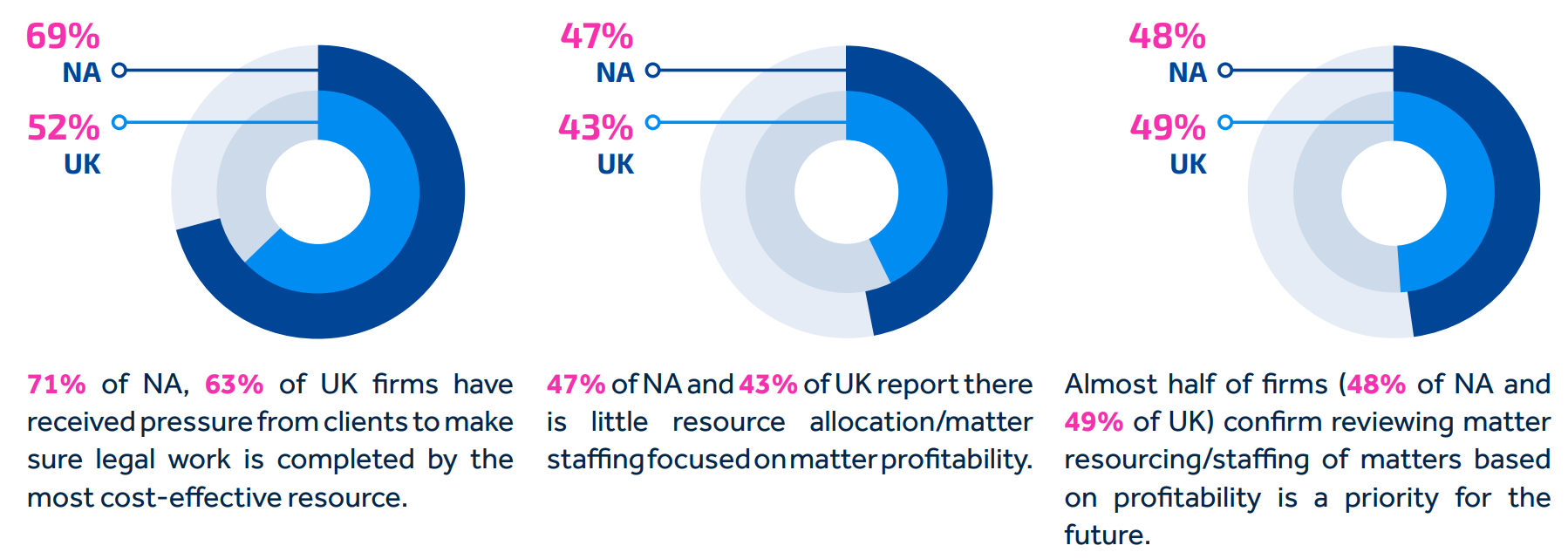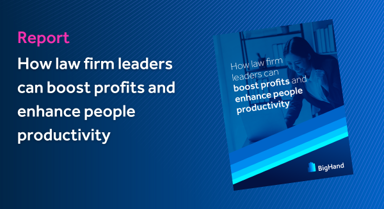Client expectations and awareness of legal pricing models – as well as their own profitability concerns - are adding to the pressure for law firms: 71% of NA, 63% of UK firms have received pressure from clients to make sure legal work is completed by the most cost-effective resource. This is a small improvement to 2021 75% of NA, 67% of UK. Firms are responding – with 63% of NA and 66% of UK encouraging lawyers to delegate to the most cost-effective resource.
However, the disconnect between strategic ideals and operational reality is damaging performance. 47% of NA and 43% of UK insist there is little resource allocation/matter staffing focused on matter profitability in their firm, which is a concern. More significant however, is that 37% of NA and 38% of UK respondents also believe too much partner time is spent on resourcing matters. That is an extraordinary finding, indicating that far too many partners lack either the access to information or confidence in/commitment to cultural change when it comes to resourcing matters – or both.
This approach is not only inefficient but also a waste of top-rated billable time, hence profit, for the firm. As confirmed in BigHand’s Pricing and Budgeting report, on average, 22% of NA and 24% of UK of law firms believe that failing to use the right resource to complete phases and tasks is contributing to profit leakage.
Unfamiliar Cost Pressures
Few firms have any experience of managing a cost base increasing at this pace. With clients experiencing the same financial pressures, their expectations for pricing transparency and appropriate resource allocation will also rise. It is now imperative to implement strong controls to improve matter profitability – and effective resource management is a fundamental component of that process.
Ensuring the right work is sent to the right resource at the right cost can transform profitability and reviewing matter resourcing/staffing of matters based on profitability is a priority for 48% of NA and 49% of UK firms over the next 24 months. Successful firms are also recognising that effective resource management is just one element of business-driven change. It is also important to create a ‘one firm’ approach to profitability and transition away from traditional, practice led mini-business operations.

The addition of business focused roles such as Pricing Managers, Legal Project Managers and Resource Managers is positive. It reinforces the commitment to ensuring matters are handled by the right skills, that team members are effectively utilised and that work in completed in a way that aligns with requirements. This also ensures pricing meets both client and business needs. These individuals cannot, however, operate in isolation – especially if firms have any chance of addressing head on the competitive positioning adopted by the Big Four.
If firms are truly embracing this new way of working, they should be identifying ways for these individuals and functions to work together for the benefit of the firm, not their individual goals. By empowering collaboration, and sharing operational data, from employee availability and experience to billable rates and client expectations, firms can offer the best service at the best cost while also meeting employee expectations and creating a consistent, firm-wide business model.
In a legal environment managing both unprecedented employee challenges and the transition to hybrid working, a reactive approach to matter staffing is not only ineffective, but it also creates business risk.
How much time are partners spending restaffing matters due to employee turnover? How can law firms confidently meet client demands for greater visibility and the use of the right resource at the right time, without a robust central process supported by up to date, accurate information about lawyer availability, experience and skills? Can individual lawyers be 100% confident they have avoided unconscious bias and are actively working to support career goals and DEI objectives when trying to resource matters under time and cost pressures?
How much billable time is now lost due to inappropriate resourcing levels when firms (58% of NA and 56% of UK) are compelled to rely on anecdotal evidence to drive recruitment/replacement plans because they have no information on skills/level required to inform decisions? Given the cost of recruitment and the need to accurately match individuals to the right opportunities to improve retention as well as meet client demands, how can firms confidently assess needs without understanding the current utilisation of attorneys across the business at every level of seniority and experience?
Without the information and structures required to support this process, a fair and effective resource management model will never become embedded throughout the organisation. Yet 69% of NA and 62% of UK say lawyers and partners still decide how to resource their own matters. Lack of information continues to constrain equitable and effective resource management: 55% of NA and 54% of UK firms have either no data or partial data relating to the capacity or utilisation of associates. In 2021, the research found 46% of NA and 38% of UK firms reported an issue around partial or no data relating to the capacity/utilisation of associates. This increase confirms that the issue is getting worse and is more prominent for firms in 2022.
Can law firms really afford to continue with this outdated approach given the current cost pressures and employee expectations, especially in a hybrid working environment?
This was an excerpt from the report 'Legal Resource Management - The Present and Future Impact on Law Firms'. Access the full report to dive deeper into the findings from over 800 legal management professionals:







